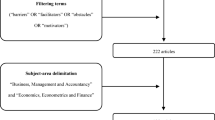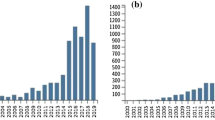Abstract
The literature on the characteristics of the Triple Helix (TH) and university–industry–government relationships has not sufficiently shared research on this topic in Asia. Based on the assumption that the literature does not provide a sufficient overview of the sparse and complex yet diverse process of TH research in Asia, this study examines the characteristics of TH scholars such as their affiliations, preferred journals, international linkage patterns, and semantic discourse networks by analyzing their research articles. The results identify the most prominent TH scholars, journals, issues, and research trends in Asia and suggest a need for deeper and more creative analyses of the TH model in the region and for longer time periods for longitudinal analyses.




Similar content being viewed by others
References
Barnett, G. A., Chung, C., & Park, H. W. (2011). Uncovering transnational hyperlink patterns and web-mediated contents: A new approach through cracking.com domain. Social Science Computer Review, 29, 369–384.
Borgatti, S. P., Everett, M. G., & Freeman, L. C. (2002). UCINET for windows: Software for social network analysis. Harvard: Analytic Technologies.
Chung, C., & Park, H. W. (2010). Textual analysis of a political message: The inaugural addresses of two Korean presidents. Social Science Information, 49(2), 215–239.
Datta, S., & Saad, M. (2011). University and innovation systems: The case of India. Science and Public Policy, 38(1), 7–17.
Etzkowitz, H. (2007). University–industry–government: The Triple Helix model of innovation. EOQ Congresses Proceedings. 51st EOQ Congress, 22–23 May, 2007. Prague.
Etzkowitz, H. (2008). Triple helix innovation: Industry, university, and government in action. London: Routledge.
Etzkowitz, H., & Brisolla, S. N. (1999). Failure and success: The fate of industrial policy in Latin America and South East Asia. Research Policy, 28(4), 337–350.
Etzkowitz, H., & Leydesdorff, L. (2000). The dynamics of innovation: From national systems and "mode 2" to a triple helix of university–industry–government relations. Research Policy, 29(2), 109–123.
Etzkowitz, H., Webster, A., Gebhardt, C., & Terra, B. R. C. (2000). The future of the university and the university of the future: Evolution of ivory tower to entrepreneurial paradigm. Research Policy, 29, 313–330.
Gibbons, M., Limoges, C., Nowotny, H., Schwartzman, S., Scott, P., & Trow, M. (1994). The new production of knowledge, the dynamics of science and research in contemporary societies. London: Sage.
Hossain, D., Moon, J., Kang, H. G., Lee, S. C., & Choe, Y. C. (2012). Mapping the dynamics of knowledge base of innovations of R&D in Bangladesh: Triple helix perspective. Scientometrics, 90(1), 57–83.
Khan, G. F., Cho, S. E., & Park, H. W. (2011). A comparison of the Daegu and Edinburgh musical industries: A triple helix approach. Scientometrics, 90(1), 85–99.
Khan, G. F., & Park, H. W. (2012). Editorial: Triple Helix and innovation in Asia using scientometrics, webometrics, and informetrics. Scientometrics, 90(1), 1–7.
Kim, H., Huang, M., Jin, F., Bodoff, D., Moon, J., & Choe, Y. C. (2012). Triple helix in the agricultural sector of Northeast Asian countries: A comparative study between Korea and China. Scientometrics, 90(1), 101–120.
Kwon, K. S., Park, H. W., So, M., & Leydesdorff, L. (2012). Has globalization strengthened South Korea’s national research system? National and international dynamics of the triple helix of scientific co-authorship relationships in South Korea. Scientometrics, 90(1), 163–176.
Leydesdorff, L. (2001a). Indicators of innovation in a knowledge-based economy. Cybermetrics, 5(1), 2.
Leydesdorff, L. (2001b). A sociological theory of communication: The self-organization of the knowledge-based society. Parkland: Universal Publishers.
Leydesdorff, L. (2003). The mutual information of university–industry–government relations: An indicator of the triple helix dynamics. Scientometrics, 58(2), 445–467.
Leydesdorff, L., & Sun, L. (2009). National and international dimensions of the triple helix in Japan: University–industry–government versus international coauthorship relations. Journal of the American Society for Information Science and Technology, 60(4), 778–788.
Park, H. W., Barnett, G. A., & Chung, C. (2011). Structural changes in the 2003–2009 global internet hyperlink network. Global Networks, 11, 522–542.
Park, H. W., Hong, H. D., & Leydesdorff, L. (2005). A comparison of the knowledge-based innovation systems in the economies of South Korea and the Netherlands using triple helix indicators. Scientometrics, 65(1), 3–27.
Park, H. W., & Lee, Y.-O. (2009). A mixed text analysis of user comments in a portal site: “BBKgate” in the 2007 presidential election of South Korea. Journal of the Korean Data Analysis Society, 11(2), 731–744.
Park, H. W., & Leydesdorff, L. (2010). Longitudinal trends in networks of university-industry-government relations in South Korea: The role of programmatic incentives. Research Policy, 39, 640–649.
Shapiro, M. A. (2012). Receiving information at Korean and Taiwanese universities, industry, and GRIs. Scientometrics, 90, 289–309.
Sharif, N., & Baark, E. (2011). The transformation of research technology organisations (RTOs) in Asia and Europe. Science Technology Society, 16(1), 1–10.
Shin, J. C., Lee, S. J., & Kim, Y. (2012). Knowledge-based innovation and collaboration: A triple-helix approach in Saudi Arabia. Scientometrics, 90, 311–326.
Walsh, V. (1994). Technology and the economy—the key relationships: (Organisation for economic co-operation and development, Paris, 1992) p 328, 260 FF. Research Policy, 23(4), 473–475.
Wasserman, S., & Faust, K. (1994). Social network analysis: Methods and applications. New York: Cambridge University Press.
Williams, L. D. A., & Woodson, T. S. (2012). The future of innovation studies in less economically developed countries. Minerva, 50, 221–237.
Yokakul, N., & Zawdie, G. (2009). The role of triple helix for promoting social capital, industrial technology and innovation in the SME sector in Thailand. Science, Technology & Society, 14(1), 93–117.
Acknowledgments
This research was supported by Kyungpook National University Research Fund, 2013
Author information
Authors and Affiliations
Corresponding author
Rights and permissions
About this article
Cite this article
Chung, C.J. An analysis of the status of the Triple Helix and university–industry–government relationships in Asia. Scientometrics 99, 139–149 (2014). https://doi.org/10.1007/s11192-013-1100-y
Received:
Published:
Issue Date:
DOI: https://doi.org/10.1007/s11192-013-1100-y




